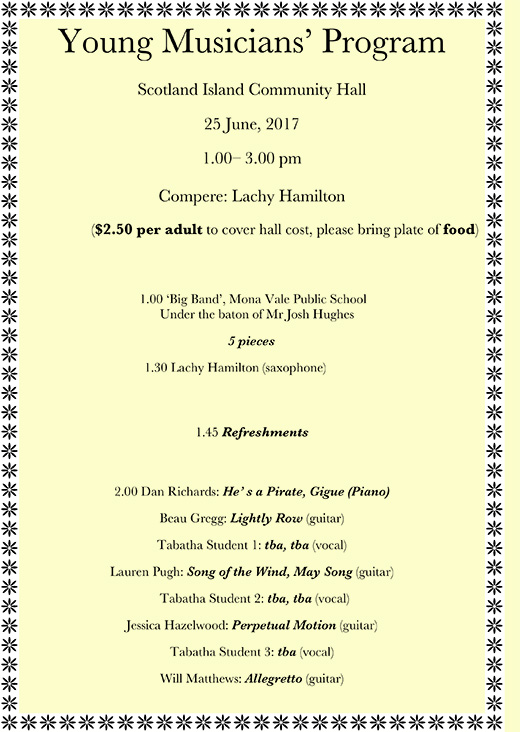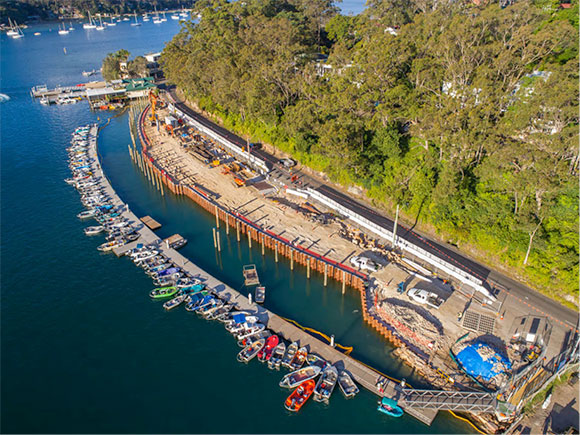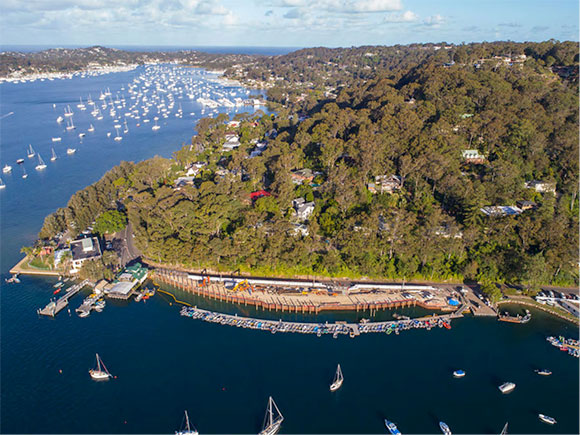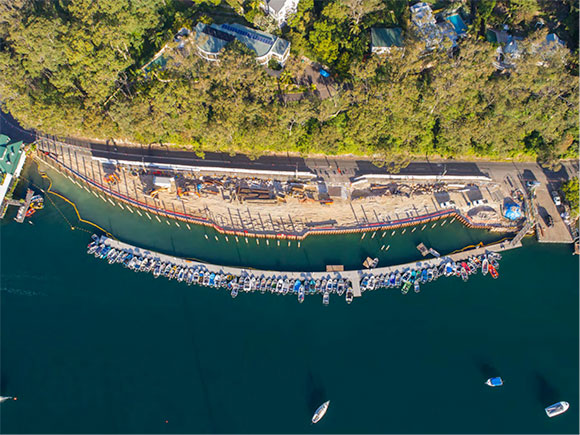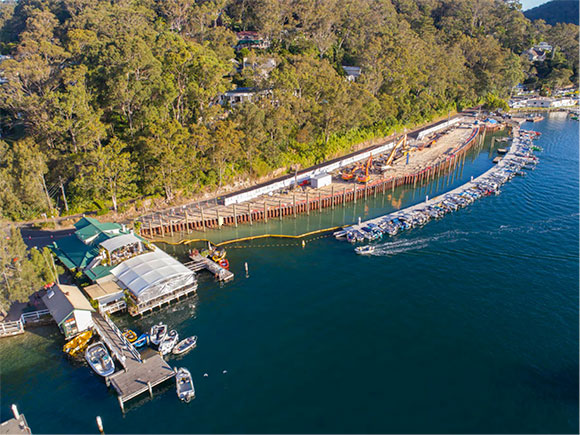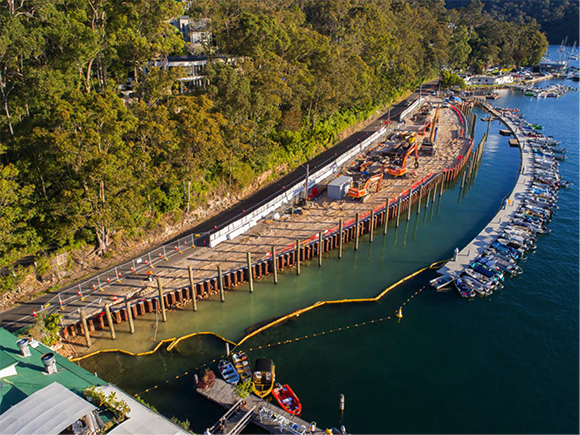Community Vehicle Out of
Service
Tuesday June 27 to Friday
June 30
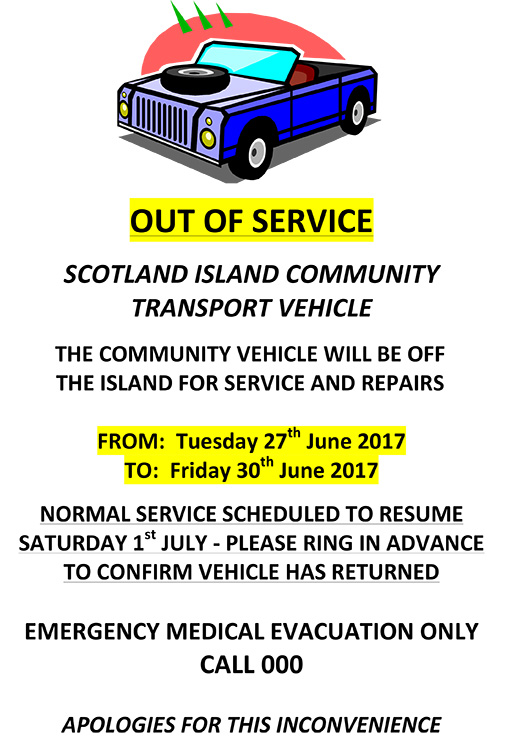 Normal Service is Scheduled to Resume Saturday 1st July
Please Check First to Confirm the Vehicle has Returned
Road Closure Notice
McCarrs Creek Road from
Wednesday 14 June
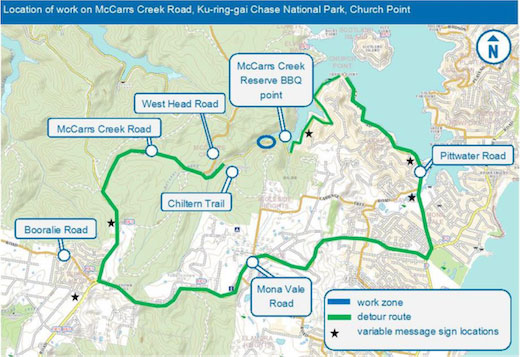 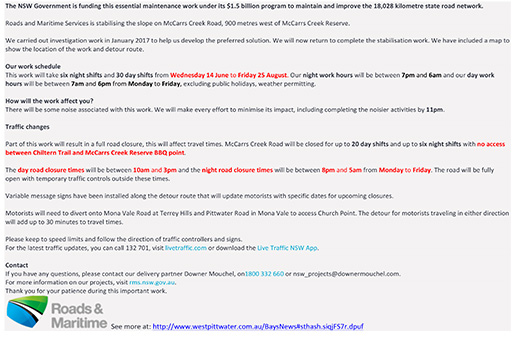 Click
to load PDF Click
to load PDF
Young Musicians Program
Scotland Island Community Hall
from 1:00 - 3:00pm
25 June 2017
McCarrs Creek Road
Realignment Images
Courtesy:
West Pittwater Community Association BaysNews
West Pittwater Rural Fire
Brigade
THIS WINTER
DON'T GO UP IN SMOKE
There's nothing quite like a good wood fire, but the West Pittwater RFS
is warning householders not to burn unseasoned wood or slowly burn wood
overnight.
Unseasoned firewood, (also called greenwood ) hasn’t had time to dry
properly. This unseasoned wood uses its energy to remove the remaining
moisture from the wood, rather than warming your home.
The danger of burning
unseasoned woods or allowing fireplaces to burn slowly overnight.
Burning wood and fossil fuels at low temperature causes incomplete
combustion of the oils in the wood, which are off-gassed as volatiles
in the smoke.
As the smoke rises through the chimney it cools, causing water, carbon,
and volatiles to condense on the interior surfaces of the chimney flue.
The black oily residue that builds up is referred to as creosote, Over
the course of a season creosote deposits can become several inches
thick. This creates a compounding problem, because the creosote
deposits reduce the draft (airflow through the chimney) which increases
the probability that the wood fire is not getting enough air to burn at
high temperature.
Since creosote is highly combustible, a thick accumulation creates a
fire hazard. If a hot fire is built in the stove or fireplace, and the
air control left wide open, this may allow hot oxygen into the chimney
where it comes in contact with the creosote which then ignites—causing
a chimney fire.
Chimney fires often spread to the main building because the chimney
gets so hot that it ignites any combustible material in direct contact
with it, such as wood. The fire can also spread to the main building
from sparks emitting from the chimney and landing on combustible roof
surfaces.
TIPS
- Burn only dry and well seasoned wood (at least a year
after cutting).
- Keep the wood heater air vents open for at least 20
minutes after lighting the fire,
- When you've lit your fire, check your flue around 20
minutes after lighting the fire. Go outside and have a look, if it's
smoking you know that you're not burning your fire properly.
- One of the worse things you can do is to dampen down
your fire overnight. Keep the fire live and bright and let it go out at
night. Don't turn it down to smoke away all night.
- To reduce the build-up of soot and creosote, burn the
fire fast for 1-2 hours every day the fire is lit.
- Small logs burn brightly and do not crowd the heater
as larger logs can do. Smaller logs will make a fire easier to light,
and help in establishing a vigorous fire quickly after refuelling.
- Wood is ready to burn when air-dried for at least 8
months to a moisture content less than 20%. Two pieces of dry, seasoned
wood banged together will make a loud hollow crack, whereas unseasoned
wood makes more of a thud.
- Clean your flue yearly.
Keep safe this winter
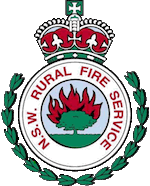
West Pittwater Rural Fire Brigade
Andrew Cutler
Captain
0423 244 444
Gina's Fashion Classes
Make Your Own Designer Dress
Gina will teach you how to transform your Favorite
Dress into a Stunning New Look
And much more: Mix and Match, Personal Style, Colour
Coordination, Repairs
Come along to a free introductory class 7pm on Thursday
22nd June 2017
Call Gina 0417 672 228
A complete set of past electronic newsletters since May 2000 can be
found and read at https://ymlp.com/archive_gesgjgm.php or
by clicking
here or
by visiting the Mona Vale Library.
The Island website is at www.scotlandisland.org.au
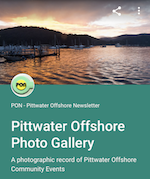
To
Contribute
If you would
like to contribute to this newsletter it's easy!. Send an
e-mail to the editor (editor@scotlandisland.org.au) or by clicking here. Type your
contribution (100 words or so would be fine) and assuming it is of
general
interest to the community, does not include matter of a political
nature and is not offensive, it will
appear next month.
Subscription
Information
To get on and off
this newsletter, click
here or got to: http://www.scotlandisland.org.au/signup
.
To change your
address, click the 'modify' link at the bottom of this
newsletter or send an email to the editor@scotlandisland.org.au
Follow the PON
The
Online Local Contacts Guide
Click HERE to load
The
views expressed in this newsletter are not necessarily the views of the
Scotland Island Residents Association (SIRA), or
the Western
Pittwater Community Association (WPCA)
|









